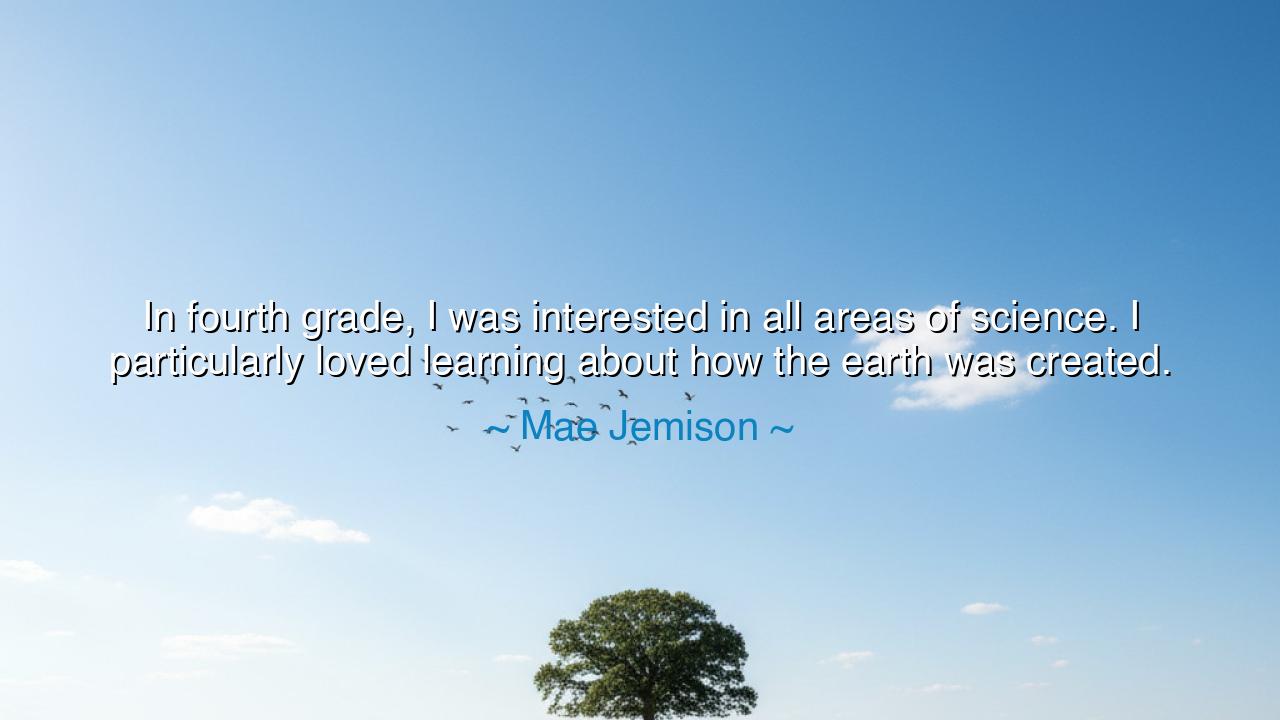
In fourth grade, I was interested in all areas of science. I
In fourth grade, I was interested in all areas of science. I particularly loved learning about how the earth was created.






When Mae Jemison said, “In fourth grade, I was interested in all areas of science. I particularly loved learning about how the Earth was created,” she was not merely reminiscing about childhood curiosity — she was revealing the spark of wonder that would one day carry her beyond the limits of the world itself. These words, simple and innocent on the surface, hold within them the eternal truth that greatness begins in curiosity, and that every discovery, every act of creation, begins with a child’s question: How did this all begin? Jemison, who became the first African American woman to travel into space, did not spring forth as a scientist overnight. Her journey began with awe — the pure, unguarded fascination with the universe that lives in the heart of every child before fear or doubt teaches them to stop asking why.
In the style of the ancients, her words are a hymn to curiosity as the root of wisdom. From the beginning of civilization, the wisest among men and women were not those who possessed all knowledge, but those who never ceased to seek it. The philosopher Thales of Miletus, one of the Seven Sages of Greece, was said to have fallen into a well while gazing at the stars — mocked by those around him, yet driven by the same yearning that later sent Jemison into the cosmos. To love “how the Earth was created” is to love the story of existence itself — to feel that we are both question and answer, dust and dream. Jemison’s memory of fourth grade is thus more than nostalgia; it is the echo of humanity’s oldest instinct: to understand the mystery of creation.
In her words lies also the power of early inspiration. For it is in youth that the mind is most open, and the soul most eager. The ancients understood this, building their academies and temples not for those who already knew, but for those who burned to know more. Jemison’s teachers, perhaps without realizing it, placed before her a mirror of the universe — the stars, the mountains, the birth of the Earth — and in that reflection, she saw possibility. Many children look upon the same lessons and see boredom; she saw destiny. To love learning is to accept an eternal invitation from the universe — to enter into its secrets with humility, to see knowledge not as conquest, but as communion.
The story of Mae Jemison herself embodies this principle. Born in 1956, she grew up in an era when the heavens seemed far away, reserved for others. Yet she never let society’s limitations dim her wonder. Her fascination with science carried her through the study of chemical engineering, medicine, and eventually into the stars aboard the Space Shuttle Endeavour in 1992. What began as a fourth-grade curiosity about the Earth’s creation became a lifelong pursuit of understanding the universe beyond it. Like the explorers and scholars of old — from Hypatia of Alexandria to Galileo Galilei — she turned wonder into courage, and curiosity into action.
But Jemison’s quote carries a subtler, gentler wisdom: that knowledge is sacred, and its roots are emotional as much as intellectual. The love of learning is not born in laboratories or libraries, but in the heart — in that quiet thrill of asking questions, of imagining what lies beyond what is known. To “love learning about how the Earth was created” is to feel kinship with creation itself — to see that we are not separate from the cosmos, but participants in its story. The ancients would have called this reverence for knowledge sophia — wisdom that joins mind and soul, science and spirit.
There is also a lesson here for every generation: nurture curiosity, especially in the young. Too often, society teaches children to memorize facts rather than to love discovery. But Jemison’s example reminds us that the greatest education begins with wonder. Encourage questions. Let the child who loves the stars dream of touching them. Let the one who marvels at the soil learn the language of the Earth. For within every question lies a seed of greatness, and within every spark of curiosity, the potential to change the world. The future belongs not to the obedient, but to the curious.
So, dear listener, remember this truth as you walk your own path: the beginning of wisdom is wonder. Whether you are a child looking at the night sky, or an adult rediscovering your sense of awe, let curiosity lead you. Study not just to know, but to feel connected — to the Earth, to the stars, to the mystery of creation. For as Mae Jemison reminds us, it is in the simple joy of learning — in the humble fascination of asking “how?” — that we find both our origin and our destiny. The same spirit that moves planets and births stars lives also within the questioning mind. Guard that spark, and let it guide you always toward light.






AAdministratorAdministrator
Welcome, honored guests. Please leave a comment, we will respond soon